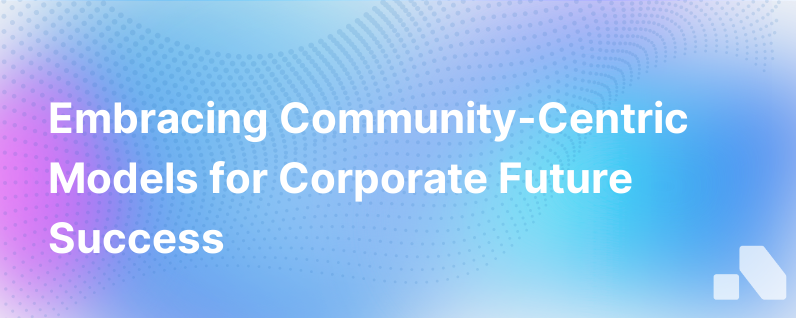
In the age of digital transformation and rapidly evolving consumer behaviors, the corporate world is experiencing an epoch-making shift. Traditional business models centered on top-down communication and profit maximization are giving way to a more inclusive and participatory approach - the community-centric model. This evolution is reshaping how corporations operate, engage with stakeholders, and drive value, thus heralding a promising era wherein businesses are not merely transactional entities but interconnected ecosystems that thrive on meaningful relationships, shared visions, and collaborative growth.
Why Community-Centric Approaches are Becoming Crucial
Today's consumer is informed, socially conscious, and values-driven. They are less influenced by conventional advertising and more by shared experiences and social proof. Several studies have illuminated this trend: consumers increasingly support brands that align with their personal values and beliefs. Thus, corporations that foster a strong, engaged community are better positioned to win the hearts and wallets of their target audience, eschewing outdated one-way communication models in favor of rich dialogues and collective participation.
In the community-centric model, the corporation extends beyond its own walls, energizing dialogue, and innovation among customers, partners, employees, and even competitors. This new paradigm is not solely about community management but about embedding community at the very heart of the corporate strategy.
Anticipating the Future of Corporate Evolution
As we peer into the corporate crystal ball, several key trends outline the future of community-centric organizations:
1. Strategy and Values Aligned with Community
Compelling missions and value propositions resonate with consumers. Corporations are expected to stand for more than their products; they must champion values that mirror those of their customers. Patagonia's activism in environmental conservation or TOMS Shoes' one-for-one model are prime examples of how community and corporate values intertwine.
2. Co-Creation and Collaboration
Forward-thinking companies are leveraging the collective creativity and expertise of their communities to co-create products, services, and experiences. This democratic approach taps into the diverse pool of ideas, fosters a sense of ownership among community members, and leads to innovations that better cater to market needs.
3. Customer Advocacy and Trust
In a community-centric world, customer advocacy becomes a potent marketing force. Trust and transparency form the bedrock of the corporation-community relationship. By nurturing brand evangelists who authentically advocate for the company, corporations can amplify their message and extend their reach organically.
4. Corporate Social Responsibility (CSR) as a Foundational Element
Corporate social responsibility transitions from being an ancillary initiative to a core tenet of business models. In the community-centric future, CSR initiatives contribute significantly to brand perception and are woven into the DNA of the business, rather than existing as independent arms.
5. Decentralization and Empowerment
Decentralization manifests in community governance and decision-making. When community members feel empowered to influence corporate directions and outcomes, loyalty and engagement soar. This could be seen through crowdsourced decision-making platforms or customer advisory boards that play a role in guidance.
6. Digital and Physical Worlds Converge
Communities manifest both online and offline, with corporations bridging the two worlds through events, pop-ups, and immersive branded experiences. The blending of digital and physical worlds engenders more robust and multi-dimensional community engagement.
7. Data-Driven Personalization
As corporations become more community-centric, they'll utilize data not just to sell but to deliver personalized, context-aware content and experiences that add real value to the community members' lives.
8. Sustainability and Long-Term Orientation
The relentless pursuit of quarterly earnings is replaced with a longer-term view that acknowledges the sustainability of resources—be they environmental or social—as a priority. A community-centric corporation seeks sustained growth that benefits all stakeholders.
The Role of Technology in Shaping Community-Centric Corporations
Technology is the silent enabler of this seismic shift. Advanced data analytics, AI, and machine learning provide deeper insights into consumer behavior and preferences, while social platforms and collaboration tools facilitate global, 24/7 community engagement. Meanwhile, blockchain presents new avenues for transparency and trust.
Furthermore, as remote work becomes more prevalent, corporations are seeking to maintain company culture and a sense of belonging amongst dispersed teams. Digital platforms enable a corporation's community to maintain cohesion, foster an inclusive culture, and solidify its collective identity irrespective of geography.
Preparing for a Community-Centric Tomorrow
For corporations, the shift to a community-centric model requires bold leadership, a rethinking of core operations, and the capacity to embrace transparency and vulnerability. It also demands a willingness to relinquish some control, allowing the community to chart its course.
In preparing for this future, corporations must:
- Invest in community-building platforms and technologies.
- Empower customer success and community management teams with the tools and autonomy they need.
- Include community feedback in strategic planning.
- Prioritize value alignment and authenticity in messaging and actions.
Corporations that emerge as leaders in the community-centric future will be those that recognize and respect the power of community, harness its collective intelligence, and foster a culture of mutual growth and inclusivity.
In summary, the corporation of the future places community at its core, leveraging it not only as a sounding board but as a key pillar of its strategic vision and operations. It represents an exciting evolution for businesses, one where the strength of a company is directly tied to the strength and involvement of its community.
In closing, while tools and platforms such as Aomni can enable corporations to transition to a community-centric approach with ease, the heart of the transformation lies in a fundamental shift in mindset - viewing the community as the very essence of corporate existence rather than an afterthought or target audience. This is where enduring success lies.